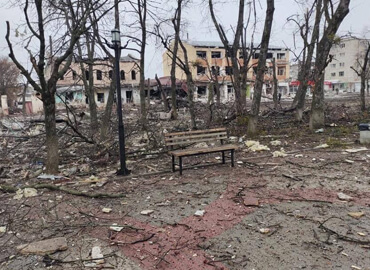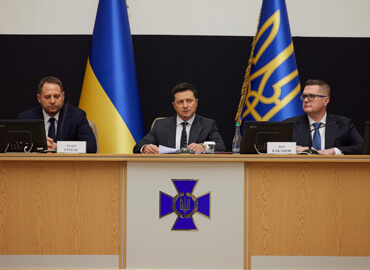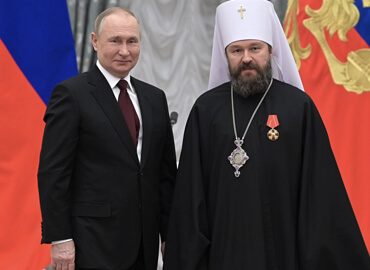On June 28, the Belarusian Foreign Ministry finally told the head of the EU Delegation Dirk Schuebel everything it thinks about the new sanctions, calls to start a dialogue with the opposition, respect for human rights and other «actions that threaten national security.» As is often the case, countersanctions would harm the citizens of Belarus and the regime itself.
The matter concerns the actual expulsion of a diplomat and suspension of participation in the Eastern Partnership and the readmission agreement with the EU. In addition, Belarus has banned the entry of representatives of European structures and persons from EU countries who «contributed to the introduction of restrictive measures.» These steps, as conceived by the Belarusian authorities, should close the way for European officials not only to Belarus itself, but also to Russia, as these countries have a common «black» list.
In general, the rhetoric of the Belarusian Foreign Ministry with a set of anti-sanctions should convince an outside observer that it is the EU that is putting pressure on the «sovereign and independent state» and pushing it into the arms of its eastern neighbor. This leaves the Belarusian side, as it sees it, room for maneuver even at the level of rhetoric: not withdrawal from the Eastern Partnership, but suspension of participation; not breaking the readmission agreement, but «the beginning of implementation of the process for suspension.»
«The proposals from the Belarusian side on the development of dialogue, interaction, and cooperation with the European Union based on principles of equality and mutual respect remain in force,» sums up the press service of the Foreign Ministry for those who are particularly obtuse.
Coordination of efforts to protect sovereignty
The break in relations between Belarus and Europe is obviously beneficial for Russia. Even a diplomatic term has been found – not the self-isolation of an Eastern European country, but the protection of sovereignty. The process of «protecting sovereignty,» which Vladimir Makei and Sergei Lavrov agreed to coordinate at a meeting in Moscow on June 18, presupposes the maximum deprivation of Belarus of that notorious multi-vector diplomacy that so irritates its Russian partners.
The rejection of neutrality, acceleration of coordination of integration roadmaps, the deepening of military cooperation, destruction of civil society and national media, worsening of relations with neighbors, expelling diplomats, banning national symbols, rewriting history to please the mythology of a neighboring state – this is just the visible part of the iceberg for coordinating and protecting sovereignty in the Kremlin’s understanding. Alexander Lukashenko’s regime moved towards this with enthusiastic willingness and did, it seems, even more than was demanded of him.
Therefore, the withdrawal from the Eastern Partnership looks like another concession.
Since the moment of announcing the Polish-Swedish initiative, Russia perceived the union as hostile and considered it a way to put before participating countries a geopolitical choice. Despite this, Lukashenko allowed Belarus to participate in the project and, moreover, he remained in the initiative even after the scandalous 2010 elections and the sanctions the EU imposed in response to falsification of results and repression. His main argument before the Kremlin was that we will ensure that the Eastern Partnership (EaP) is not «against someone,» but becomes a bridge for the «integration of integrations.»
There was other profit in participating in the European initiative, in addition to the easy blackmail of Russia. The EU, through various Eastern Partnership programs, allocated considerable funding for joint projects and direct assistance. The total amount of EU assistance to Belarus was 30 million euros annually. In 2014-2020, Belarus received 170 million euros within the framework of the EaP. Since 2016, the European Investment Bank has allocated 530 million euros to Belarus to support the private sector, small and medium-sized enterprises, key infrastructure, and climate projects. The amount of support could have been much greater if the Belarusian regime had made at least minimal efforts.
Everything has lost all meaning
By 2020, the contradictions within the EaP became so obvious that Ukraine, Georgia, and Moldova began to perceive the initiative rather as a brake on the path of integration with the EU. On May 21, 2021, they created a joint format for cooperation – the Association Trio. Therefore, it is difficult to disagree with Makei, who on May 26, 2021, said that «without Belarus, this initiative also loses all meaning.»
And yet it is difficult to explain the regime’s demarche through only an attempt to sell a dead carcass to the Kremlin and once again please Vladimir Putin.
The actions of the Belarusian authorities at the level of security officials, the Ministry of Foreign Affairs, and the government together are subordinated to some special logic that is impenetrable, foremost by Western partners. The mistake lies in that all the steps taken by the EU, the U.S. and the collective West proceed from an internal understanding: the regime will not harm its own people, will not destroy the country, and, in the end, will not harm itself. But the authorities in Minsk shoot themselves in the foot over and over again, bombing Volozhin, cutting off their nose to spite their face.
For example, it is difficult to explain the situation with the Hi-Tech Park with normal logic. This is a real miracle, born in spite of rather than thanks to. For a decade, it has been a showcase of the regime, a symbol that a dictatorship can be modern and effective. Thanks to the billions in IT revenues, a new economy has grown in Minsk, providing good jobs for tens of thousands of citizens from other industries. And then one day of voting was enough for the frightened «experts» to start talking on Belarusian television on the night of August 9-10 about the well-fed programmers, and 10 months later another «expert» suggested that IT specialists pack their bags and leave.
It is impossible to imagine how in a country with huge hidden unemployment people have for a decade persuaded people not to rely on the state, but to open their own small business, and then, for some ridiculous reason, declare that all individual entrepreneurs are basically criminals, so taxes need to be sharply increased.
It is difficult to understand why a European civilian plane was forced to land, thereby burying the aviation industry with Belavia at its head. For the sake of this state-owned airline, Belarus has been denying flights to low-cost airlines and other more successful companies for decades. The incredibly expensive tickets of the monopolist were supposed to give Belavia the opportunity to grow, purchase new aircraft, and compete on equal terms with leading carriers. A single ploy deprived the country of hundreds of millions of dollars in income and Belavia of its future.
These are just a few examples of the «irrational» decisions made by authorities in recent months. They show that the regime is ready to sacrifice even the most valuable things to maintain power. But there are tens of thousands of arrested and beaten individuals, thousands of criminal cases, and repressive laws, according to which anyone could be considered a criminal.
To understand this special logic, you need to look at the situation through the eyes of a person who is convinced that the population should be grateful for everything. And suddenly this very population votes against you for no apparent reason and says to your face that they do not want you. If you see this through the prism of an aging autocrat, it becomes clear that he wants revenge. This is simple revenge on the people who rejected you.
We are seeing the implementation of the threat voiced by Vladimir Makei in early April 2021. «Any further tightening of sanctions will lead to the fact that civil society will cease to exist,» he said at the time. Now it has become clear how the Belarusian authorities are going to achieve this.
Материал доступен на русском языке: Месть за нелюбовь. Кому адресованы антисанкции Минска











